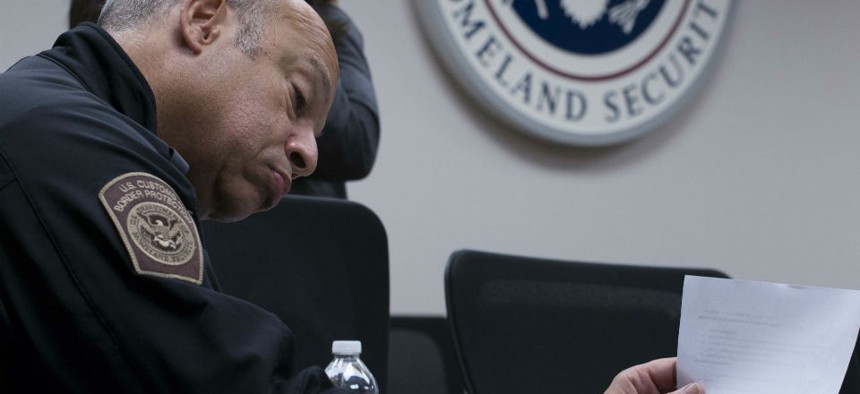
Homeland Security Department file photo
If DHS Shutdown Comes, Most Employees Would Still Report to Work
Republicans continue the push to ‘defund’ Obama’s immigration action, but their options are limited.
Momentum is building on Capitol Hill to pass a hybrid short-term and long-term budget measure to keep federal agencies open past Dec. 11.
The House is expected next week to pass a spending bill that would provide line-by-line funding levels for nearly all agencies—all but the Homeland Security Department. Instead, DHS would receive a continuing resolution through early 2015 under the Republican plan, which would keep funding at the agency’s current level.
House Democrats oppose the proposal, saying it would ultimately lead to next year’s Republican-controlled Congress shutting down DHS over President Obama’s executive immigration action.
“We will not be enablers to a Republican government shutdown, partial or otherwise," House Minority Leader Nancy Pelosi, D-Calif., said last week.
If the so-called “CRominbus” passes and Congress is forced to tackle DHS funding in a few months, Republicans’ leverage could be limited. While conservative lawmakers want to deny funding for Homeland Security agencies tasked with carrying out Obama’s order, appropriations leaders from both parties called such a strategy impossible. House Appropriations Committee Chairman Hal Rogers, R-Ky., and others said because U.S. Citizenship and Immigration Services is fee-funded, Congress’ hands are tied.
Conservatives balked at that suggestion though, saying there was precedent to use appropriations bills to create policy at fee-funded agencies. A Congressional Research Service report released this week found 17 provisions in the 2014 omnibus bill that dictate policy at fee-funded agencies, despite rules that technically prohibit the practice.
“Both the House and Senate have internal rules encouraging the separation of money and policy decisions,” CRS said. Provisions that provide new authorities, modify previously enacted authorization law or impose new duties are disallowed under congressional rules. Still, the practice of including policy “riders” in appropriations bills has a long history and is common practice annually.
Most of the examples identified in the report authorized funding for some program, including one at USCIS and another immigration-related provision at the Justice Department’s Executive Office for Immigration Review. In one example, however, Congress prohibited the funding of a program at a fee-funded agency, as some Republicans seek to do at DHS. A provision in the 2014 omnibus legislation blocked the Federal Communications Commission from spending any funds on a certain program until specific concerns had been addressed.
Some Republicans were reenergized by that precedent.
“Congress must respond to the President’s unlawful action by funding the government but not funding illegal amnesty,” said Sen. Jeff Sessions, R-Ala., who asked CRS to conduct the research. “This is a perfectly sound and routine application of congressional authority.”
Even if Republicans followed Sessions’ guidance and next year passed a DHS funding measure that restricted the enforcement of the executive action on immigration to defer deportations for certain undocumented immigrants, Obama would likely veto it. That could lead to the realization of Pelosi’s fear: a shutdown of DHS. The impact of that, however, could be limited.
Shutdown precedent allows two types of federal employees to continuing working while there is a lapse in appropriations at their agencies: exempted employees, whose salaries are paid for by non-appropriated funds; and excepted employees, who are “performing emergency work involving the safety of human life or the protection of property.”
These rules shielded DHS from most of the effects of the two-week government shutdown in 2013. About 86 percent of DHS employees reported to work despite the appropriations lapse. About 31,000 of DHS’ employees were furloughed during last year’s shutdown, while nearly 200,000 worked their regular schedules. The disruption would certainly be felt at the agency enough to affect daily operations, but the impact would be relatively minimal and would not likely influence Obama’s action.
The political gamesmanship will affect DHS operations before the funding process even reaches that point, according to Homeland Security Secretary Jeh Johnson. At a congressional hearing this week, the department chief called the short-term gambit a “very bad idea,” as it would prevent the department from funding new priorities. New Secret Service hires, opening a new detention center and enhancing immigration enforcement operations would all fall by the wayside under a short-term continuing resolution, Johnson said.
“Short-term continuing resolution funding measures are disruptive, create uncertainty, and impede efficient resource planning and execution,” said Marsha Catron, a DHS spokeswoman. “They inherently slow down day-to-day operations, force leadership to make short-sighted versus long-term decisions, and adversely impact operations in a manner that is hard to overcome if full funding is provided later in the year.”







